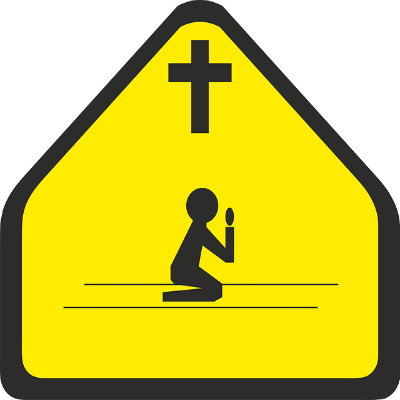Thank you for visiting. We trust that you have enjoyed reading our articles.
Men, You Can Add Power to Your Prayers!
“Therefore I tell you, whatever you ask for in prayer, believe that you have received it, and it will be yours” (Mark 11:24 NIV).

Our prayers already have great power – more than we can ever imagine. The problem is that we often fail to recognize the power of our prayers.
Prayer is an open line of communication with God. The idea that we have 24/7 ability to connect to the Creator of heaven and earth is hard to comprehend.
First, why would God want to talk with us? Is there a right and wrong way to pray? Why does God answer some prayers but not others? Does it matter that we only have a little faith?
Thankfully, the Bible gives us insight into these questions and more. Since God desires to have a relationship with us and knows of our human frailties, it’s no surprise He gives us some help. Below are some of my favorite Scriptures on prayer.
1.
Luke 18:13-14: “But the tax collector stood at a distance. He would not even look up to heaven, but beat his breast and said, ‘God, have mercy on me, a sinner.’ I tell you that this man, rather than the other, went home justified before God. For everyone who exalts himself will be humbled, and he who humbles himself will be exalted.”
This Scripture is from the well-known story of the Pharisee and the tax collector praying in the temple, reveals the prayer that allows us to enter into a relationship with God: “God, have mercy on me, a sinner.” The tax collector was honest with God about his sin. He humbled himself, repented, and acknowledged his need for God’s mercy.
Summary: The first step in developing a prayer life is to humble our self and call upon God for salvation.
2.
Psalm 66:18: “If I had cherished sin in my heart, the Lord would not have listened.”
The Psalmist teaches us a major obstacle to God’s willingness to hear our prayers—unconfessed sin. The word “cherished” means to embrace. If we embrace our sin, we are not reconciled with God, and the sin will act as an impediment between us. God knows we will not live a sinless life, but He does want us to continue to remove our sins. “If we confess our sins, he is faithful and just and will forgive us our sins and purify us from all unrighteousness” (1 John 1:9).
Summary—We can’t live a consistently sinful lifestyle and expect God to hear our prayers.
3.
“The eyes of the LORD are on the righteous and His ears are attentive to their cry.”
As we move closer to God, we begin to gain more of His peace which transcends all understanding (Philippians 4:7). We know that He is listening to our prayers because we are both seeking the same things. The Psalmist assures us that He is carefully attuned to our lives.
Summary—If you trust God, He will hear your prayers.
4.
Daniel 9:18: “We do not make requests of you because we are righteous, but because of your great mercy.”
This verse is from Daniel’s prayer on behalf of the Jews exiled in Babylon. It reveals an important truth about prayer—that God answers our prayers because of His mercy, not our good works. While there is nothing we can do to earn our salvation, God’s intention is that our salvation will result in acts of service.
Summary—God’s mercy, not our actions, is the basis for answered prayers.
5.
Psalm 5:3: “In the morning, O LORD, you hear my voice; in the morning I lay my requests before you and wait in expectation.”
The Psalmist is teaching us to have eager expectation as we pray. This is reinforced in the Mark 11:24. “Therefore I tell you, whatever you ask for in prayer, believe that you have received it, and it will be yours.” As we pray with confidence, God sees our faith and trust in Him.
Summary—Pray with anticipation that God will hear your request.
Prayer: Dear God: We thank you for the blessing of prayer. May we always be appreciative of it. Amen.
Meet the Author
Todd Shupe is a Men’s Ministry Specialist through the General Commission of United Methodist Men and is in training to be a Certified Lay Minister through the Louisiana Conference of the United Methodist Church. He currently serves as the President of the Baton Rouge District of United Methodist Men and is a Board Member for Gulf South Men and serves on the Action Team for The Kingdom Group. He is a volunteer for the Walk to Emmaus, Grace Camp, and Iron Sharpens Iron. Todd resides in Baton Rouge, Louisiana.
We welcome your comments below.
Liked this post?
Read more below or search for more topics...
-
Fire Consumes or Purifies
Fire Consumes Or Purifies “When you pass through the waters, I will be with you; and when you pass through the rivers, they will not sweep over you. When you walk through the fire, you will not be burned; the flames will not set you ablaze” (Isaiah 43:2 NIV). One thing that is as certain as death and taxes is that in this fallen world is we will have problems. Jesus said these words in John 16:33 many years ago, but they still ring true today. “In this world you will have trouble. But take heart! I have overcome the world.” To... -
The Spiritual Gift of Presence
The Spiritual Gift of Presence “Then they sat on the ground with him for seven days and seven nights. No one said a word to him, because they saw how great his suffering was” (Job 2:13 NIV). Spiritual gifts are something every Christian is given when they receive the gift of salvation. Just as the gift of salvation is by grace through faith, so are the spiritual gifts. There are several different spiritual gifts. These gifts are not something we possess; they are God’s supernatural ability to act in our lives in various ways. There are ministry gifts, manifestation gifts, and motivational gifts.According... -
The Biblical Roots Of Trust
The Biblical Roots Of Trust Trust is an essential component to any relationship. Trust is essential for a relationship to move past a superficial level to a more intimate and personal basis. Our relationship with God is based on our trust that first, He lived and died for our sins and second, He has our best interests at heart and loves us unconditionally.The actual phrase “Jesus loves me,” cannot be found in the Bible but there are examples that support this fact. In John 13:34 Jesus said, “As I have loved you, you must love one another” and in John 15:9 He said, “As the Father has...



